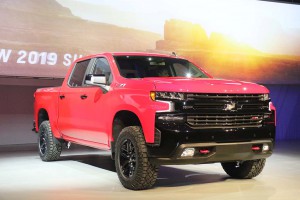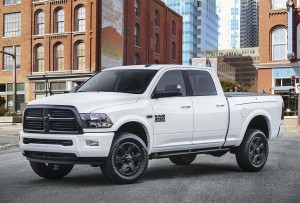Even as Fiat Chrysler gets ready to pull its full-size pickup truck production out of Mexico, General Motors CEO Mary Barra told reporters over the weekend that GM will continue building its own trucks South of the Border.
Barra, who had briefly served on President Donald Trump’s corporate advisory council until it was disbanded early last year, has been one of the business world’s more vocal supporters of the controversial Commander-in-Chief’s economic policies. And she again defended the administration’s efforts to renegotiate the North American Free Trade Agreement.
“I’m very confident NAFTA will be modernized and it will be very good for all three countries,” Barra said during a scrum following the debut of the all-new 2019 Chevrolet Silverado pickup.
Not everyone is ready to accept that rosy forecast.
During his presidential campaign, then-candidate Donald Trump repeatedly criticized Mexico and, to a less degree, Canada for allegedly taking unfair advantage of the U.S. through NAFTA, which went into effect in January 1994. The New York businessman and TV reality show host was particularly critical of Ford Motor Co. which, at the time, was planning to move small car production to Mexico. But Trump also took shots at GM, Toyota and other carmakers, and threatened to hit them with a “big border tax.”
While Trump quickly backed down from the tariff proposal he sent the new U.S. Trade Representative off to hammer out major revisions to the trade deal and threatened to scrub NAFTA if he didn’t get what he wanted from the two allies.
(Click Here for a look at the all-new 2019 Chevrolet Silverado.)
Both Canadian and Mexican negotiators have been reluctant to accept the American proposals and criticism has been fierce from within the U.S. – especially from the auto industry. David Cole, the director-emeritus of Michigan’s Center for Automotive Research, has warned that killing, or even seriously altering, NAFTA could seriously damage the North American auto industry, resulting in far lower productivity and higher costs for consumers.
While Barra has tried to strike a positive chord on the negotiations she acknowledged late last year that GM officials – along with senior representatives from a number of other automakers – expressed their own concerns during a meeting with Vice President Pence. At the time, Barra also said she thought the administration understood the auto industry’s concerns.
And it appears that automakers are actually hoping for as few changes as possible impacting their own business. Since NAFTA was passed, the industry has created a tightly woven web of supplier and assembly plants across North America.
In recent months, there has been some movement of parts and assembly operations from Mexico back to the U.S. Fiat Chrysler this month announced it would shift the heavy-duty version of its soon-to-be-updated Ram pickup from a plant in Saltillo to a facility in the Detroit suburbs.
But asked if she will move production of some of GM’s new 2019 Silverado trucks from Mexico to the U.S., Barra said that isn’t in the plans. She then downplayed the significance of that operation, arguing that 80% of GM’s North American production comes from the U.S., where the automaker also employs 80% of the regional workforce.
(Click Here for more on FCA’s decision to move Ram HD production.)
Alan Batey, the global head of the Chevrolet brand, subsequently noted that the engines for the Silverado come from plants in the U.S., as well, something that actually helps create American jobs.
GM did move several small operations back from Mexico last year. But, like its competitors, it downplayed the impact Pres. Trump had on the decision.
When Ford Motor Co. scrubbed plans to build a second plant in Mexico last year, Joe Hinrichs, then the automaker’s president of the Americas, stressed that it was purely a “business decision,” reflecting declining demand for the Focus sedan that the second plant was supposed to build. Production will now shift to China, instead, where Focus production will be consolidated.
FCA’s decision to build the Ram also appears to reflect business realities. The truck is largely sold in the U.S. and its high profit margin doesn’t necessarily call for trying to save minor on labor by building in Mexico. The Saltillo plant won’t close but will instead produce a new “global” product that will better benefit from lower Mexican wages, according to several analysts. And because of Mexico’s extensive network of free trade agreements the new model will yield additional savings by reducing tariffs. That was of little benefit for the Ram pickup.
Auto industry officials continue to press the White House to keep NAFTA alive and limit any changes that would impact their operations. But barring a breakthrough in the so far stalemated negotiations, Trump has continued to warn he could pull the U.S. out of the deal.
Asked what that would mean for GM, Chevy boss Batey told reporters, the automaker will “have to worry about that when we get there.”
(GM asks feds to okay public testing of fully driverless Chevy Bolt. Click Here for the story.)




There is no doubt that NAFTA has benefited GM and others. Problem is it has harmed enough American workers that they can elect a president. Barra is whistling past the graveyard. She has no choice. Ending NAFTA makes assets in Mexico near worthless. In the long history of this country ending free trade causes wage increases and economic growth. The only exception was 1930-32 when tariff increases coincided with the Great Depression. From 1816 until 1967 we were the most tariff protected nation on earth. History says we will experience great economic growth by ending NAFTA.
Actually, JJ, history says quite the opposite. The U.S. has always grown in times when we have free trade, never when we restrict it.
Paul E.